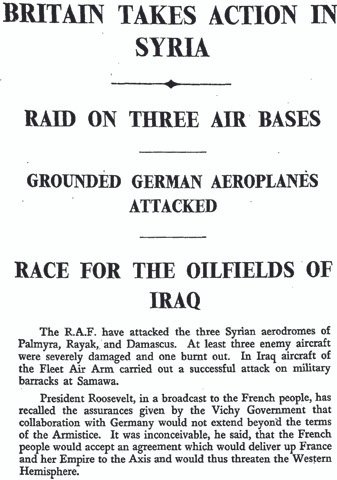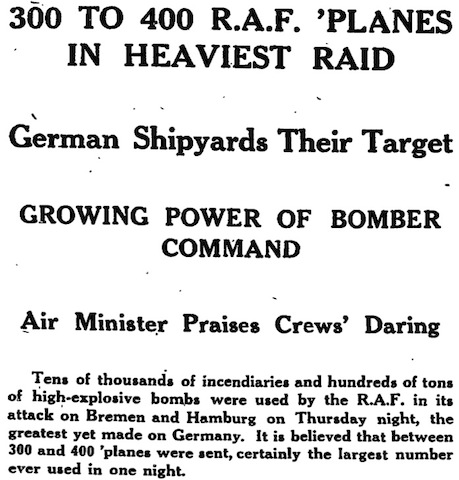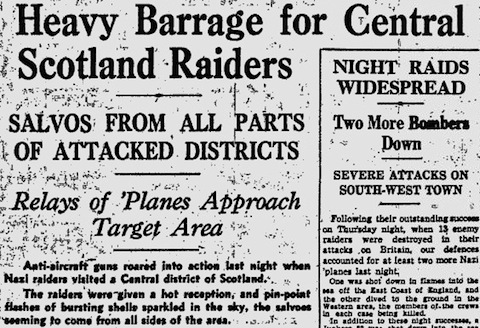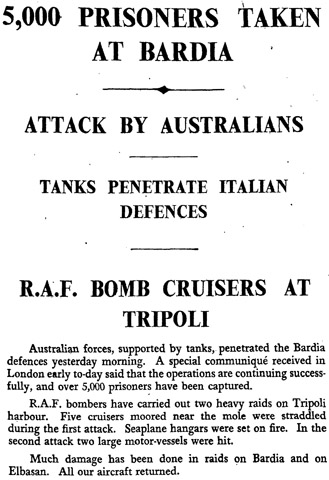
Without even waiting for a response to Eden’s warning, on Thursday RAF aircraft bombed three Vichy aerodromes in Syria, as The Times reports (4). According to RAF HQ, Middle East Command:
At Palmyra three Ju90s, two other German aircraft, and one Cr42 were machine-gunned. At least three of these aircraft were severely damaged and one other was burnt out.
General Dentz, the French High Commissioner in Syria, protested these raids, saying that they had killed a French officer. He further claimed that the German aircraft were there due to ‘forced landings’ and that his officials, ‘according to the terms of the Armistice, procured their most rapid departure’. The diplomatic correspondent to The Times comments that Syria ‘must now be counted an important arena of war’.
So far the Germans appear to have sent few aeroplanes across Syria to Iraq. They are exploring the road in a manner which seems almost tentative; but it would be unwise to expect them to draw back.
The reason is Iraq’s oil, which Germany needs not so much for petrol as for lubrication, especially for the Luftwaffe. The quality of lubricating oil produced by its own plants is ‘good but by no means perfect’, and while the Soviets are willing to supply Germany’s needs, they ‘are hard bargainers, and they insist upon prompt German deliveries in return’.
Possession of Iraq would greatly lessen the German anxieties over supplies. Out of the total Iraqi production of 4,300,000 tons of oil a year (to quote the 1938 statistics), about 3,000,000 tons have been of the heavy type from which lubricating oil is derived.
The Turkish government is reportedly worried by the prospect of German encirclement (Manchester Guardian, 7). This is mainly because of the German involvement in Syria and Iraq, but also because of a reported buildup of the Luftwaffe in Greece ‘with a view to attacking in Crete, Cyprus, and in the Middle East, and possibly to support a renewed push in Libya’ (where British forces have just recaptured the frontier village of Sollum).
It is supposed that German assurances to Turkey will hold good until Germany has completed the encirclement of Turkey by getting a footing in Syria and Iraq, or, alternatively, until Germany has attempted such an encirclement and failed.
A bob each way, then. The German army is also massing on the ‘Moldavian frontier’, which ‘points to the imminence of German-Russian negotiations’.
The question is whether Hitler will demand only economic concessions or demand Soviet military co-operation in the Middle East in return for a promise to recognise the Persian Gulf as a Soviet sphere of influence.
Turning to the home front now, ‘air raids on Britain during Thursday night were on a comparatively light scale’ (4). The official Air Ministry/Ministry of Home Security communiqué states that
Bombs were dropped at several scattered points, mostly in coastal districts. Some damage was done at one or two places on the coast and at one point there was a small number of casualties.
Last night, ‘A west Midlands town was one of the targets for the enemy bombers’, according to The Times (4). During daylight hours, German fighters ineffectually attempted to attack RAF aerodromes, and also strafed civilians:
Six Messerschmitt 109s attacked a south-east coast town from 400ft. last evening. Many people caught in the streets had remarkable escapes as bullets spattered everywhere. One man was hit by splinters of a cannon shell and taken to hospital.
The Home Security Minister, Herbert Morrison, gave a speech on the BBC last night on winning the ‘battle of the flames’. In the Guardian‘s paraphrase (4),
Having been cushioned for hundreds of years from the worst shocks of war the British people were not always quick enough to recognise imminent danger. They found it difficult to give up their ordinary ways. The house-holder who wanted to stop in his own street, the business man or the worker who wanted to argue about rights and wrongs while the bombs fell — well, the time come when we must get beyond all that.
“At this moment,” he said, “there is no room for private selfishness, no room for sectionalism of any kind. This is total war. We need the whole population to wage it — 40,000,000 fire-fighters.”
Private selfishness? There is evidence both for and against this in today’s Guardian (8). Last night the list of awards for gallantry in civil defence work was announced. For example Post Warden Robert Leslie Platten and Warden Thomas Edgar Davis, both from Croydon, receive the George Medal for saving thirty people trapped in an air raid shelter. After they got them out,
Davis found a baby buried under wreckage. He placed himself in such a position that no more would fall on the child while Platten and the child’s father worked to release it.
At the other extreme is Edward Jonas Osman, 47, of ‘no settled address’ (but who was arrested in Salford), who was convicted of passing rumours about the war ‘likely to cause alarm and despondency’. On the night of 9 May he engaged in conversation with three young women in a supper bar.
He told them that London was “finished” because it had been “laid flat by air raids,” and added, “I have just come from Liverpool. The people of Liverpool have let us down. They have surrendered, and have started parading the streets carrying banners. They have also put white sheets on all the buildings […] Liverpool is under martial law. No one is allowed near the place.”
Overhearing this, a soldier went outside and notified police, who arrested him. Osman admitted that ‘I know it is wrong, but I wanted to look big. I only repeated what other people told me’.
Men born between 1 January and 31 December 1902 inclusive must register at their local Ministry of Labour and National Service office today, unless they are seamen in which case they should register at a mercantile marine office. They may express a preference for service with ‘the Royal Navy, the Royal Air Force, the Police War Reserve, and the Auxiliary Fire Service’ (7).
![]() This work is licensed under a Creative Commons Attribution-NonCommercial-NoDerivatives 4.0 International License.
Permissions beyond the scope of this license may be available at http://airminded.org/copyright/.
This work is licensed under a Creative Commons Attribution-NonCommercial-NoDerivatives 4.0 International License.
Permissions beyond the scope of this license may be available at http://airminded.org/copyright/.




Pingback: Airminded · Sunday, 18 May 1941
It almost sounds like the Germans are pulling squadrons out of the west. Maybe they’re going to Moldavia, for extra negotiating.
Pingback: Airminded · Post-blogging 1940: final thoughts and conclusions